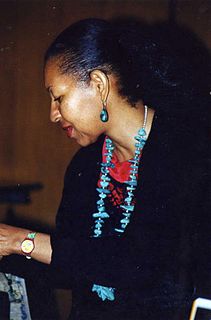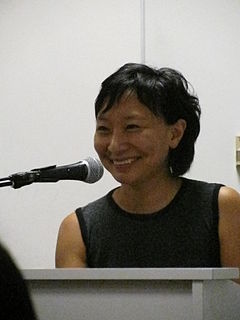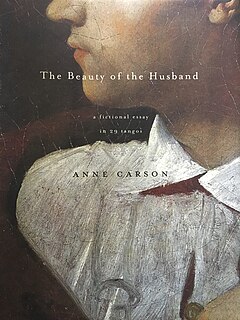Related Research Articles
Anne Carson is a Canadian poet, essayist, translator, classicist, and professor.
In English literature, an elegy is a poem of serious reflection, usually a lament for the dead. However, "for all of its pervasiveness ... the 'elegy' remains remarkably ill defined: sometimes used as a catch-all to denominate texts of a somber or pessimistic tone, sometimes as a marker for textual monumentalizing, and sometimes strictly as a sign of a lament for the dead".
Confessional poetry or "Confessionalism" is a style of poetry that emerged in the United States during the late 1950s and early 1960s. It is sometimes also classified as a form of Postmodernism. It has been described as poetry of the personal or "I", focusing on extreme moments of individual experience, the psyche, and personal trauma, including previously and occasionally still taboo matters such as mental illness, sexuality, and suicide, often set in relation to broader social themes.

Rae Armantrout is an American poet generally associated with the Language poets. She has published ten books of poetry and has also been featured in a number of major anthologies. Armantrout currently teaches at the University of California, San Diego, where she is Professor of Poetry and Poetics. On March 11, 2010, Armantrout was awarded the 2009 National Book Critics Circle Award for her book of poetry Versed published by the Wesleyan University Press, which had also been nominated for the National Book Award. The book later earned the 2010 Pulitzer Prize for Poetry. She is the recipient of numerous other awards for her poetry, including an award in poetry from the Foundation for Contemporary Arts in 2007 and a Guggenheim Fellowship in 2008.

Ai Ogawa was an American poet and educator who won the 1999 National Book Award for Poetry for Vice: New and Selected Poems. Ai is known for her mastery of the dramatic monologue as a poetic form, as well as for taking on dark, controversial topics in her work. About writing in the dramatic monologue form, she's said: "I want to take the narrative 'persona' poem as far as I can, and I've never been one to do things in halves. All the way or nothing. I won't abandon that desire."

Michael Dana Gioia is an American poet, literary critic, literary translator, and essayist.

Anne Stevenson was an American-British poet and writer and recipient of a Lannan Literary Award.

Abraham Moses Klein was a Canadian poet, journalist, novelist, short story writer and lawyer. He has been called "one of Canada's greatest poets and a leading figure in Jewish-Canadian culture."
New Formalism is a late 20th- and early 21st-century movement in American poetry that has promoted a return to metrical and rhymed verse.
Anne Barrett Rouse is an American-British poet. Along with Michael Donaghy and Eva Salzman, she has been cited as a noted American-British contributor to contemporary British poetry.
Jennifer K Dick, is an American poet, translator and educator/scholar born in Minnesota, raised in Iowa and currently living in Mulhouse, France. She has been classified as a post-L=A=N=G=U=A=G=E school poet and, by Amy Catanzano, as a U+F+O+L+A+N+G+U+A+G+E poet with a strong background in lyric and narrative tradition.

Cathy Park Hong is a Korean American poet, writer, and professor who has published three volumes of poetry. Much of her work includes mixed language and serialized narrative. She was named on the 2021 Time 100 list for her writings and advocacy for Asian American women.
Milan Orlić is a Serbian poet, writer and publisher.
Evan Jones is a Canadian poet and critic. He completed his secondary education at Lawrence Park Collegiate Institute in Toronto. In 2003, he was a finalist for the Governor General's Literary Awards for Poetry. He is currently a creative writing teacher at the University of Bolton, where he resides full-time.

Ágnes Lehóczky is a Hungarian poet, academic and translator born in Budapest, 1976.
Maria Terrone is an American poet and writer. She is the author of three collections of poetry: Eye to Eye (2014), A Secret Room in Fall (2006) and The Bodies We Were Loaned (2002). She has been nominated four times for a Pushcart Prize and has received the Individual Artist Initiative Award from the Queens Council on the Arts. Her poetry ranges widely in subject, including themes of history, family and contemporary urban environments.

The Beauty of the Husband: A Fictional Essay in 29 Tangos is a 2001 collection of poetry by Anne Carson that won her the T. S. Eliot Prize.
This is a bibliography of works by the Canadian poet, essayist, translator, classicist, and professor Anne Carson.
"The Sleepers" is a poem by Walt Whitman. The poem was first published in the first edition of Leaves of Grass (1855), but was re-titled and heavily revised several times throughout Whitman's life.

Jade Ladder: Contemporary Chinese Poetry is a 2012 anthology of contemporary Chinese poetry translated into English. The collection contains more than 200 poems from 53 poets. Nearly half are previously published English translations recommended by Chinese poet Yang Lian and the poet-critic Qin Xiaoyu, while the rest are new translations by Brian Holton. Native Cantonese and Chinese speaker Lee Man-Kay also contributed to the anthology.
References
- ↑ O’Rourke, Meghan (2010-07-05). "The Unfolding". The New Yorker. ISSN 0028-792X . Retrieved 2019-08-07.
- ↑ "Anne Carson, The Art of Poetry No. 88". The Paris Review (Interview) (171). Interviewed by Aitken, Will. Fall 2004. ISSN 0031-2037 . Retrieved 2019-08-07.
- ↑ Souffrant, Leah (2014). ""She said plain, burned things": A Feminist Poetics of the Unsayable in Twentieth Century Literary & Visual Culture". CUNY Academic Works.
- ↑ Shelton, Margaret (November 2016). "Anne Carson: Shaping the Self and Shifting Under the Reader's Gaze". Furman Humanities Review. 27.
- ↑ Rae, Ian (2011). "Verglas: Narrative Technique in Anne Carson's "The Glass Essay"". ESC: English Studies in Canada. 37 (3–4): 163–186. doi:10.1353/esc.2011.0054.